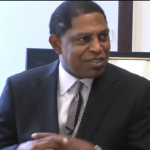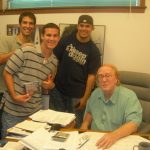Storytelling is the oldest form of communication. A good storyteller includes the audience in the experience. As a result of this intimate inclusion, people are much more likely to remember a story than a statistic.
 Lynn Hazan is passionate about communicating and combines her love for storytelling into her recruiting business. She has told stories around the world, including frequent visits to, Rancho La Puerta, a health and fitness spa in Tecate, Mexico. She has also gone on expeditions to speak to 1,300 Ethiopian children. In the midst of her travels, she has managed to run her own executive search firm, Lynn Hazan and Associates (www.lhazan.com).
Lynn Hazan is passionate about communicating and combines her love for storytelling into her recruiting business. She has told stories around the world, including frequent visits to, Rancho La Puerta, a health and fitness spa in Tecate, Mexico. She has also gone on expeditions to speak to 1,300 Ethiopian children. In the midst of her travels, she has managed to run her own executive search firm, Lynn Hazan and Associates (www.lhazan.com).
So how does Lynn combine her two passions? Here is her story:
Lynn grew up as a first generation Canadian. Her father was from Damascus and her mother from Cairo. Her parents were true pioneers and at an early age, this maverick spirit was ingrained in Lynn as she dreamt of becoming a pioneer herself.
Her first step towards embracing this drive was moving to the United States, where she received her master’s degree at Brandeis University in Waltham, before moving to Chicago to work with future ‘neurotics’ (aka graduate students) on campuses in the area. After she felt she had hit the glass ceiling and could no longer grow as an individual, she accepted a part-time telemarketing position that led her to one of her passions: recruiting.
Lynn always loved the stage and an early age she would often perform in front of her parent’s dinner guests by reciting commercials she memorized. She knew that she always loved to tell stories and rekindled her by performing a short story for her friend’s daughter’s Hanukkah party. Seeing the children’s eyes light up, she decided that she would try and pursue her passion for storytelling.
She attended workshops and seminars all the while practicing her ability to tell a tale. Meanwhile, her search firm looked for candidates tied into storytelling. She encouraged her students to tell their stories in their interview processes. Eventually, more opportunities to entertain audiences surfaced. Through her energetic interpretations of tales, she received the chance of a lifetime when she was invited to go to Ethiopia.
Her storytelling became a tool for fundraising for humanitarian relief. Lynn increasingly used her storytelling skills, not only to entertain, but also to motivate and inspire people to take action.
Because of her pursuit and desire to do what she loves, she has managed to combine two things that bring excitement and stimulation. She has ingrained them so deeply that there is no separation between who she is as a person and what she does for a living.
Some additional advice that she had to offer pertained to storytelling and getting your ducks in a row:
“The most important thing about storytelling is to touch the emotion, the soul of the audience. You have to create empathy with the audience, and make sure the story is believable. Make it sound like they’ve been on the journey with you. Tell your story, and be authentic.”
In regards to advice for obtaining a job, Lynn said:
“The more you walk like, talk like, sound like and look like a duck; if a client wants to hire a duck, the more you resemble the duck, the better the chances of getting an interview. I literally have ducks lined up on my window sill at the office. While they might look silly, actually, as a visual they are quite fun. It’s good not to be too serious in this business all the time. Candidates laugh when I tell them they need to be duck-like. I also make the analogy of mirroring your clients’ needs. The more my candidates match the specs and client needs, the better the chances of getting a job. Ducks lined up in a row; this is an obvious image of prepping and making sure the candidate is ready for an interview or opportunity. This includes background research, aligning oneself with the client needs, looking professional etc. In other words, ready and eager.”
Interview
My candidates have now called me the storytelling recruiter because in the business world, especially in the world for search, when I’m recruiting for candidates for my clients needs, I’m always encouraging them to tell their stories. I’m talking about stories about work. Because people remember stories. When you remember the story, you remember the person and their accomplishments. People don’t remember statistics.
When you want to hire people for your company, you want to hire people who are going to be assets to your firm. When I’m recruiting candidates, I’m always looking at the total candidate. Your skills, your abilities, how good a fit you’ll be to the culture of the company you’ll potentially be joining. I have to evaluate on a wide variety of criteria. And frankly, after 21 years in the business, it’s intuitive. Because I know my clients and the kinds of candidates they want to attract. No one likes to hire a stick of wood. We’re living, breathing people with all kinds of dynamics that go on within our lives, personally and professionally, and making the best matches is the most important thing. You can make a bad hire and it’s no good for everybody.
I’m a first generation Canadian and a child of immigrants.
Jewish communal service.
The best job at the lowest salary was beckoning. You take the job that gives you the most opportunity and is most interesting out of college.
After awhile I looked around and said, ‘You know what? I’m not growing. It’s time to do something different.’ I was interviewing for jobs, it was not the most pleasant experience. So I started to do telemarketing for the Goodman Theater. I was really, really good at sales.
Recruiting took advantage of my innate curiosity. I love making connections with people on opportunities. It’s a business where you constantly reinvent yourself. Because I’m always looking for new opportunities and new businesses where there’s growth, not where there’s a receeding market. Because who wants to hire when the market is going down? You want to hire where the opportunities are going up.
It’s a fun, creative opportunity to identify niches in the marketplace and find a talent appropriate to those needs. It’s been great.
I started my own firm. After awhile, people were wondering why I didn’t have my own business. This didn’t come from me, but from candidates and clients. I started to think about it and I decided it was time. I had a vision for my business and I knew I could do it. It took some guts and sleepless nights but I was ready to do it.
How I recruit talent is very interesting and it’s changed significantly because of the internet. If I get a job opening from a client, like a Communications Manager. I have a wide network of candidates because I’ve been in the business for so long and developed relationships with them. I might reach out to people on my website, or put it on my listserv to a few thousand people. I’ve put job openings on other websites. I do industry outreach events and public speaking. Wherever I meet people, there is always someone interesting to meet who may or may not be appropriate for a job today, maybe tomorrow, but maybe now.
What I say is that recruiting is cherry picking. Because I need the best talent to fit who my clients are and what their needs are in particular. Sometimes candidates get upset with me because they think I work for them. But the client pays the fee, so I have to find them the most appropriate candidate that fits what their needs are.
Sometimes I have to do a little educating because their expectations might not be realistic. I have to give them feedback, tell them what the word is out on the street, and where the talent is. Sometimes there is a gap in the talent pipeline.
Storytelling is the oldest form of communication that there is. It’s making a huge resurgence because it’s personal.
One of the things I’m passionate about is communication. It’s been ingrained me since I’ve been a little pup. All 4 foot eleven and a half of me.
If I touch your soul, I’m a good storyteller.
When it’s something that’s part of your personae, it’s not like I segment it into chapters. It’s just who I am.
How would you define passion?
Passion is something that lives beyond the moment. It’s something that’s so ingrained in who I am that you can’t separate me from the thing that I’m passionate about. Sometimes people say that’s not good. That who you are and what you do should be separate. But who I am and what I do is so intrinsically who Lynn is, that that’s part of my personae.
So it’s intensity. It’s an intense experience. It’s a vitality and inquisitiveness to life, to exploration, to constantly reinventing myself. Looking at new opportunities, however much it can be a challenge, there’s always a new opportunity waiting to be uncovered. Part of the thrill for me is to find the next opportunity.
How can I reinvent myself? How I can use new material? What’s the next trip I’m going to go on? What people am I going to meet?
My business is just as much a passion for me too because not only is it my livelihood, but it’s something that I adore. I’m always thinking about new ideas on how to market the business and do new presentations or involve people in learning about the craft. I do a lot of speaking to student audiences. It revitalizes me, and I revitalize my audience. So we kind of feed each other. That’s part of the passion for me too.
We are one people. We might not have the same color skin. It doesn’t matter what language we speak. It doesn’t matter what class we belong to. We are one people, with one common interest- to be passionate about life.
People want to take care of their families. They want to improve their lives. The human spirit is very enduring. I met people who were in prison, who fought great odds to bring democracy…life is tough for them.
There’s that human spark.
In the land of famine there is generosity of spirit. In the land of wealth, there is poverty of spirit. I wrote that my last day in Ethopia.
To be successful as a storyteller, you have to build reportie. You have to build a human connection. When you’re a storyteller, you’re in a relationship with your audience. If you can touch people’s souls, then you’ll be effective.
The most important thing is to create empathy with your audience. It touches the human spirit, it touches people’s emotions. When you do that, you’ll create an emotional bond with your audience and they’ll remember your stories forever.
The stories can change. The characters change. The endings change. The successful storyteller moves an audience. It takes the audience with him or her from point A to point B to C to conclusion. At the end, you want to the audience to feel as if they went on the journey with that person.
When I coach my candidates, I encourage them to frame whatever they’ve done in the following manner. What’s the problem or need? What opportunity or challenge does it present? What are the strategies and tactics you used? What are the results? And what did you do with the results?
Not everyone wants to hear points 1-5 in order. Some people will just say, “Tell me your thought process for why you chose accounting? Give me a story/’ It’s just a frame for how people can get into the picture. Once you’ve done that, it’s easier to communicate.
I’ve had many candidates interview for jobs and they’re stiff! Loosen up. Show me the portfolio. Talk to me about your work. When they start to talk about a story, their souls come alive. They talk differently than if someone were to ask, ‘Tell me about yourself.’
When they talk about something they have a connection with, they’re going to communicate much more effectively. When you talk from the heart and communicate why they want to go into certain professions…I always tell my candidates, tell the story that links with why you’re interested in such and such profession. So then it’s sticky in the brain and it’s your story, your experience, and it’s authentic. That’s what people will remember about you.
When a candidate interviews for a job, here are the choices. Hire a candidate who is excited, energized, has repoire with you. Or hire someone who comes in like a lump of clay. Who are you going to pick? Who do you want hanging around you all day long? Some jobs you don’t want them to be the live wire in the corner because they won’t get any work done.
The candidates who move up in life have good people skills and are able to motivate and inspire people around them. Who can set a good example and inspire people with continous growth and continous learning. When you’re around those types of people, you want to learn from them. What’s exciting about that person? What can I learn from that person that is going to help me?
People sometimes poo poo the soft skills. But the fact is that we still have to work with people. No matter what we do.
Recruiting is a very, very personalized business. If a company is choosing to pay a recruiter a fee for something, they want top talent. They want what I call cherrypicking. So I have to find the best candidate. Since I’m here in Chicago, most of my clients are here in Chicago. Since it’s a highly personalized business, I meet with candidates one on one here in the office whenever possible to check them out and see if they’re appropriate for my clients needs.
The kinds of positions I’ve been filling lately have been all over the map. From freelance copyrighters, designers, full time positions in advertising and marketing communications. Technology consulting companies. Healthcare’s hot. PR agency jobs.
Recruiting really goes through waves. When clients are ready to hire talent, that means there is growth in the market. Very often I get different clients in different businesses, but more or less they’re looking for the same kind of talent. I can leverage the recruiting work I’m doing with my candidates. So I can send one candidate on three different interviews for example. That’s when the job market is in growth mode.
The clients I work with are all over the map. They could be Fortune 500 companies, entrepreneurial companies, public relations companies, ad agencies, not for profit. For example, this year I had a lot of calls from not for profit organizations hiring. They knew me and were trying on their own to find talent, and they were having a hard time. They came to me because they knew I was going to do great work on their behalf and find them candidates in timely fashion that they couldn’t find. So that’s where my relationship building skills and working and coaching candidates really comes in handy.
Because if a candidate comes in and they have great potential, I’m going to work with. I’ll help them find their resumes, identify what their story is, help them redo their portfolios, get them some communication coaching tips…I have very high standards.
My candidates know what I put them through to interview, so when they turn around and become my clients, they’re expecting the same quality of candidates coming through the door. The process I put them through is an experience they have themselves.
Many of these candidates I’ve placed in jobs previously so they’re loyal. They’ve done great work for the companies that have hired them and stayed on for a long, long time. I’ve hired many generations of candidates for companies over time.
The number of job openings I have vary. I have a lot of job openings right now, and frankly, it’s a little bit frustrating because I have all these job openings and there’s a gap in the talent pipeline. What happens is after there has been a recession or a dot com meltdown, people stop hiring.
The nineties were great. I’d get calls from candidates from cell phones in parking lots telling me they got offered the job on the spot. Those were the go go years. After 9/11 and the dotcom meltdown, what happened is companies stopped hiring. They didn’t hire entry level people and they didn’t hire experienced people. What happens is there is a gap.
In 2005 there is a resurgence of hiring and they are all looking for management people. Worker bees. There was a candidate shortage. I had to look long and hard.
In 2006 where there are higher level jobs, as well as management jobs. As a recruiter, I typically see the trends first. Articles appear in the newspaper because they have to ramp up before they announce 10% growth in their business.
Companies need people to do the work. I hire one at a time. I don’t do 50 people at a time. It’s very much a one on one relationship with my clients.
I call work the anti-Alzheimers formula. The more you engage and have all those synapses are firing in the brain, you’ll have a better chance at not having Alzheimers.
The bottom line is your bottom line. If it’s five o’clock and you’re not seeing the results in your bottom line, you can’t walk out because you have a volleyball game. Work has to get done. I’m not advocating the 80 hour work week.






